
|
|

i
n t e r
v i e w
ALVIN
LEE
"My
heroes were the blues players ... you sit down with a bottle of
Scotch ... playing a funky blues club with lots of cigarette smoke
and booze - singing the blues."
Ten
Years After's
self-titled first album was released in 1967, but 1969's Sssh
was their break-out release following their appearance at the
Woodstock music festival. Alvin Lee's blazing blues-inspired licks
on "Going Home" in the documentary film chronicling that
historic event introduced him to a wide and appreciative audience.
After the British band's demise, Lee carried on with a critically
acclaimed solo career and occasionally Ten Years After would regroup.
NEON's Lorry Doll met up with Lee at Chrysalis Records New York
offices in 1989 right after the release of the Ten Years After album
About
Time. |
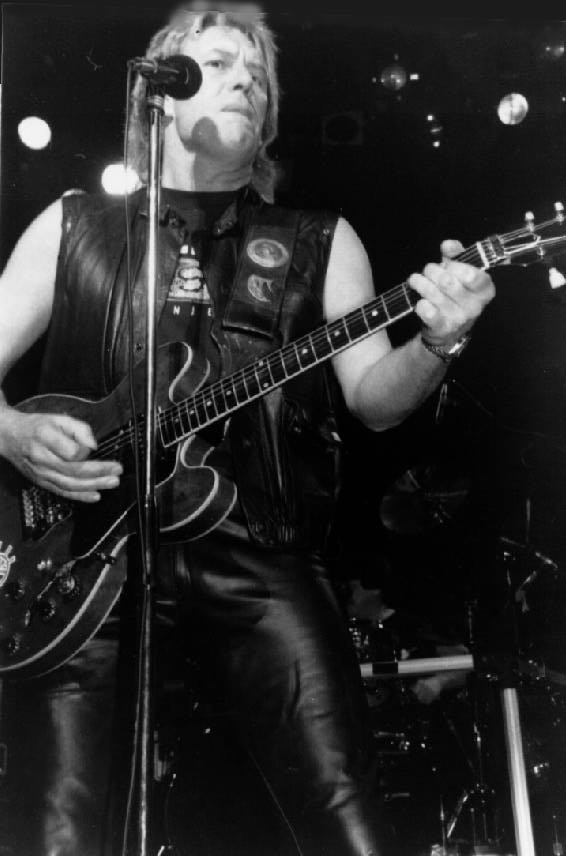
Photo by Lorry Doll |
Lorry Doll:
I like your new album a lot.
Alvin Lee: Thanks a lot, so do I.
You did it at Ardent
Studios in Memphis. You like Memphis?
I love Memphis. I suggested we do it there with Terry Manning, he
works out of there a lot. Personally, I thought I always wanted to
go to Graceland and actually I achieved an ambition there. A friend
of mine lent me a big 'ole Cadillac and I drove in the front gates!
And of course Beale Street was a lot of fun. We were jammin' down on
Beale Street after the sessions at a place called Rum
Boogie, with the house
band, Dominick. . . damn I wanted to give 'em a plug and now I
forgot their name!
How long were you in the
studio?
Ten weeks all together. Half that time it was scheduling the tracks
we didn't record. We had about fifty tunes. Everybody in the band
brought songs. We thought the fairest thing to do was let Terry
Manning pick the songs. We did fifty demos and let him pick ten out
of that. He picked about sixteen, seventeen songs and we tried them
live in the studio. When you record, some songs get better some
don't. Most of the time, probably four weeks, was taken doing that.
How do you get those
great squeaks? Do you pinch the pick or something?
I call them scroggs. Yeah, you hold the pick very shallow and as you
pick you let your thumb catch afterwards and you get a harmonic, but
you have to be quite accurate where you do it.
I almost had a heart
attack when I read in the liner notes “… Alvin Lee uses
exclusively Scalar.” I thought, “What, he's not using the
(Gibson) 335?” Then I read on and it was the strings they were
talking about, whew!
Scalar are new strings that are made in California. They're very
good. They got a high-density center wire and they get more level
and they last longer.
Do you use like a .046 to
a .010?
No, I use a .048 to .009. I go .009, .011, .015, which is very light
and the .028, .038 and .048. I used to use .052's. Dean Farley, who
makes these Scalar strings, he tried. I rang him up and I did a
digital test recording to find that these strings weren't that loud
and the bass strings weren't as loud as the top strings and he
advised me. He actually sat down and worked out what the best gauges
were for me. I need a very heavy gauge 'cause I do a lot of open E's,
hit the bass strings real hard and if you have very light strings
they go sharp. He did a bit of research for me and came up with the
ideal set. That's why I use Scalar strings exclusively.
In all the time that I've
enjoyed your music a lot has happened in the state of rock 'n' roll.
Well so they say. They keep telling me that.
I was always thankful
that you never veered too far from your original sound.
I explored a way from my roots in 1973-1976. Ten Years After broke
up in '75 and I went through that whole trip of trying to be tasty
and trying to answer the critics who said that I was all flash and
no quality. They would say that I played lots of notes and he's got
no taste and it used to bug me in those days.
Yeah, but they don't know
how to play guitar.
That's true and it was wrong of me to get bugged. My mistake. But I
did let it happen. I went through this phase where I did funky tasty
music, and I did this tour with this band called Alvin Lee and
Company, and I didn't do any of the Ten Years After material. I did
all this tasty stuff. The funny thing was that I got great reviews
from all the critics saying, “Oh, this guy can really play.” But
I missed the rock 'n' roll. I'd get to a kinda place where there was
a rowdy crowd and I'd want to break into something hot and steamy
and the band wasn't quite capable 'cause it was too tasty. I had to
go through that to realize that it wasn't the direction I wanted to
go in. What I realized was that you have to appreciate that what you
do easiest is probably what you do best and that rock 'n' roll and
blues to me is no hard work at all, it's just fun. I can knock out a
rock tune in ten minutes and I kinda think, “If that's so easy, I
ought to do something that's a challenge. I'll try to write Paul
Simon type of songs.”
Yeah, but isn't it a
challenge to write the same A-D-E…?
Yeah, it is. It was a misguided thing and I got away from my roots.
Another thing which told me, seeing the writing on the wall, I went
to see Jerry Lee Lewis, he played in Nottingham, England, and I was
expecting to hear “Great Balls Of Fire” and “Whole Lot of
Shakin” and he did all country tunes. I came out of there feeling
really disappointed. It didn't take me long to realize that if
people came to see me and I didn't do “Goin' Home” or “Good
Morning Little School Girl” they'd be disappointed too. |
I wouldn't.
You wouldn't, then you must be a real fan then. For a little while I
had that band Ten Years Later...
The “Rocket Fuel”
album?
That's right. I wasn't really pinching the name, it was the tenth
anniversary of Ten Years After. I couldn't carry it on 'cause then
it'd have to be Eleven Years Later, etc. But that really was the
coming back to my roots and playing' rock 'n' roll and I've had no
qualms ever since. If you remember like Eric Clapton, Jeff Beck …
all these guys, they changed their styles. They all left their roots
and went into playing softer music - a little bit less energetic.
When I heard your new
record, I said, Good. Man, this isn't the same old songs twenty
years later but a contemporary version of what you would be doing
ten or twenty years later, it's rock 'n' roll!
I was very pleased with the way the album turned out. Terry Manning
stands a lot of credit for that. He kept us playing simple. We have
a tendency to get complicated and start throwing in bars of 5/4
rhythm and maybe trying too hard and Terry would say, “Come boys
this is rock 'n' roll, let's keep it simple.” I think in being
simple, it's probably turned out the nearest a studio album could to
our live sound. We've been trying to do that for years and Terry is
amazing 'cause somewhere in his head, very early on, he seemed to
have a picture … he didn't tell us what to play, he kind of
steered us.
|
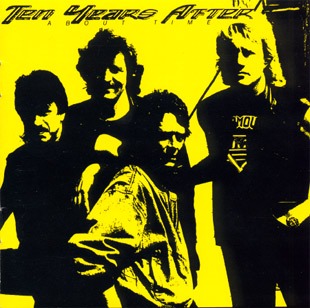 |
| He
wasn't a Svengali producer, like some of these producers
that say, “This is my record and you'll do what I say.”
Terry just brought out the best in the band.
What
I wanted out of making the album was, not to be old
fashioned - that could have been the worst thing we could
have done - to sound like we were still stuck in the
sixties. I wanted it to sound fresh but I didn't want it
to sound modern, because I think modern music is kind of
synthesized-computerized and that people are kind of fed
up with that and that's why they're looking back to
established bands for reality in music.
You got bands going out
now miming to tapes on stage and I think it's disgusting
and it's not fooling the audiences. They go to see someone
they like - seeing four or five people on stage and
hearing ten people. Even those that see some guy up there
playing a million notes a minute and they think, “This is
a good guitar player.”
Whereas someone who
plays tasteful like you or Billy Gibbons or. . .
Billy came down to see us in Houston. It was great to see
him again. He's always been one of my favorites. That guy
he can play one note instead of ten and that's more to
where I'm leaning nowadays. But then again it's not even
how many notes. A lot of people think if you're fast
you're good, but you can play real simple lines and easy
notes fast. It's not really how fast you play, it's what
you're actually playing. There's not many people who can
tell.
And not many of them can
get good squeaks!
Ah, me and Billy are the squeak masters.
I like the song, “I'm
Working In A Parking Lot.”
Nobody ever did work in a parking lot (laughs).
|
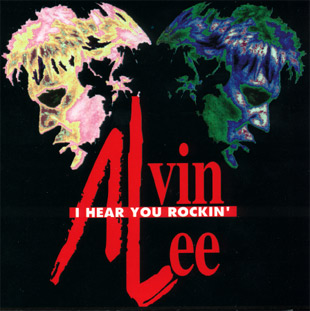 |
You had a
recording studio a while back, didn't you?
Well, I have one that's moved around a lot. I have one in
my house. I live in Oxfordshire, about forty miles west of
London. Near the airport, easy for touring. I use it
more as workshop, as a song writing tool, it keeps me off
the streets when I'm not doing gigs. Us going to Memphis
was a really good thing to do. The whole environment of
Memphis added something. The blues and jazz and it made
you feel you were somewhere a bit special. I think it rubs
off on the record. It's good to get away from the
telephone. If I'm working at home and have a personal life
that I have to take care of which you don't really need
when you're making a record and you have to concentrate
100% on the recording.
At home, do you
practice or run through scales?
I've never run through scales. I play a lot. I pick up the
guitar and fiddle. I play by instinct, from the hip. I
just pick up and play what seems to come natural and that
seems to work. Which is great 'cause that means I almost
don't have to practice. I have to practice keeping my mind
free of not playing scales but adding those to my
itinerary of licks. Basically, I just hear something in my
head, more a fast reaction, if I hear something I go
through it very quick. The best gigs for me, and the sad
thing is that no one knows, 'cause I can play within the
limits if I'm really cool and professional I'll stay 90%
within the limits don't go wrong…
Play it safe. |
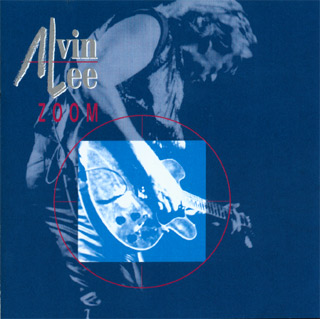 |
Yeah, keeping in
control. And they think, “Great.” they can't compare my best to
my 90%. They think if I don't make any mistakes I'm going great.
When I'm really hot I'm going like 100% and you're liable to make
mistakes. Some people are gonna think, “Hmm, he's not up tonight.
He's making bad notes.” But on a good night I'll hear
something, like a flash of an instinct, and hear something and go
for it and on a good night I'll get it and that's the buzz for me.
That's where I get my kicks 'cause I'll think, “I've never done
that before!” But no one else knows. If I screw it up they'll know!
But I prefer to do that, there's no need to play it safe live.
There's a few tricks, like if you play a wrong note - play it twice
and people will think it's right! (laughs) I've never been studious,
there was always guitars when I was learning, blues. My father used
to like chain-gang work songs - prison work songs - pretty ethnic
stuff for a white kid from England to be listening to but I grew up
with that kind of playing around the house. I tried to emulate the
sounds without copying the notes. If I could make a guitar sound
like John Lee Hooker and by doing it that way I didn't copy the
notes. But some of the best guitarists, they would sit down with
Chet Atkins record - ‘Shit Hopkins’ as we used to call him -
he's like a really good technician - could play anything, and some
guys would sit down and in five or six hours get it perfect note for
note and sound almost as good as those chaps. I didn't really see
the point in that, 'cause I'm only gonna sound almost as good as
Chet and who needs two Chets anyway. And I'm gonna sound almost as
good as those other guys copying it so what I did was try to get the
overall effect that he was getting and using my own notes. Which, I
think is important, that's what I tell young guitarists, don't copy
those solos note for note just try to do your own version of it,
make your guitar sound like the guy but use your own notes and
develop your own style.
You're still using
Marshall.
Yeah, for however many years. Unfortunately I'm not using a Gibson
these days. Sad to say the Japanese are making Toki. They're making
a better '58 Gibson then Gibson. I've been down to Gibson. I showed
'em this Toki and said this is actually your shaped guitar. It looks
just like one and it plays better then theirs, and said why don't
you make one like this? They said, “Oh yeah, we will, we will.”
But they haven't followed it through. The Gibson name is magic and
I'd rather be playing a Gibson, but the Japanese bought up all the
best wood ten years ago. When I took my original ‘58 Gibson
out I had a host of Japanese technicians swarming around it. They
measured the density of the wood, they measured the hardness of the
frets and it came out better. It's amazing. I still got my original
Woodstock Gibson with all the peace signs on it, but it's kind of
getting too valuable to take it out on the road. I don't like
hanging guitars up on the wall, but the Hard Rock Cafe offered me
fifty grand for it and it's worth much more to me. I do take it out
on some gigs, but on this tour I didn't know the crew personally and
so I didn't want to risk losing it.
How would you describe
the difference in eras in rock?
It's like, the different innovators. Django Reinhart was the great
guitarist of the forties and Jimmy Hendrix was the great guitarist
of the sixties. The seventies was a bit hazy. . . and it's all a
matter of taste. There's no "Best" guitarist. The eighties,
there's so many good guitarists, Joe Satriani, Jeff Healy, Stevie
Rey Vaughan, Mark Knoffler, Eddie Van Halen. . .
|
I was really
shocked when I read that Billy Gibbons was his (Van Halen's)
inspiration. . .
Eddie is good, he's a very good guitarist He's not like that guy
Yngwie Malmsteen. Eddie's a hot technician. A bit over the top
really, but even Eddie backs off occasionally!
I like the song, "Going
To Chicago."
Yeah, looking to the roots, that's what that one's all about. The
black masters, the people I used to listen to when I was growing up,
are kind of sadly forgotten, particularly in America. See I was
brought up on American music. I had relatives there that would send
me stuff when it would come out. When I first came to America in
'67-'68, I expected everyone in America would know who Big Bill
Broonzy and John Lee Hooker was. It's American heritage and I was
amazed hardly anybody had heard of these guys. Maybe 20% of them had
heard of B.B. King and not many of them had heard of Freddy King or
Albert King, Buddy Guy and all that. We were going around and
touring and they (the critics) were saying, “. . . this British
blues music you play is great.” And I'm sayin', “It's American
music.” I've been copying American music all my life. So
that song, "Going To Chicago" it's a dedication to those
black guys. You can go down to a blues club there and see the real
thing. Chuck Berry has been so influential to rock ‘n' roll, the
Rolling Stones and Ten Years After and every band I know has at
least one Chuck Berry song on the set. Muddy Waters has always been
a hero of mine. And they're heroes 'cause of their attitude. Someone
was asking me the other day, all the kids these days listen to Eddy
Van Halen or Joe Satriani and they stand in front of the mirror and
practice and so who did you stand in front of the mirror and copy? I
never thought about it, I never stood in front of the mirror.
My heroes were the blues players and you don't stand in front of the
mirror to play blues. You sit down, with a bottle of Scotch and
that's my image of a musician, playing a funky blues club with lots
of cigarette smoke and booze singing the blues. Not wearing
leopard-skin leotards and doing that. Okay, let's get to the meat of
it. You want to ask all about the sex and the drugs and the rock
‘n’ roll! (Laughs)
Okay, so how have things
changed?
There was a big talk about that last night with the band. 'Oh, how
the business has changed so much.' I'm not really into business, to
me it hardly changed at all. People still love rock ‘n’ roll.
Doing live gigs the reaction to me seems the way it's always been.
In fact it seems almost like the same people who haven't grown up.
They still get off on rock ‘n’ roll. It's like "Jungle
Drums", shake it up, the rhythm is gonna get you like the
jungle drums. Just like jungle drums move people, it gets in your
soul, rock ‘n’ roll is the same. Rock ‘n’ roll will never
die! |
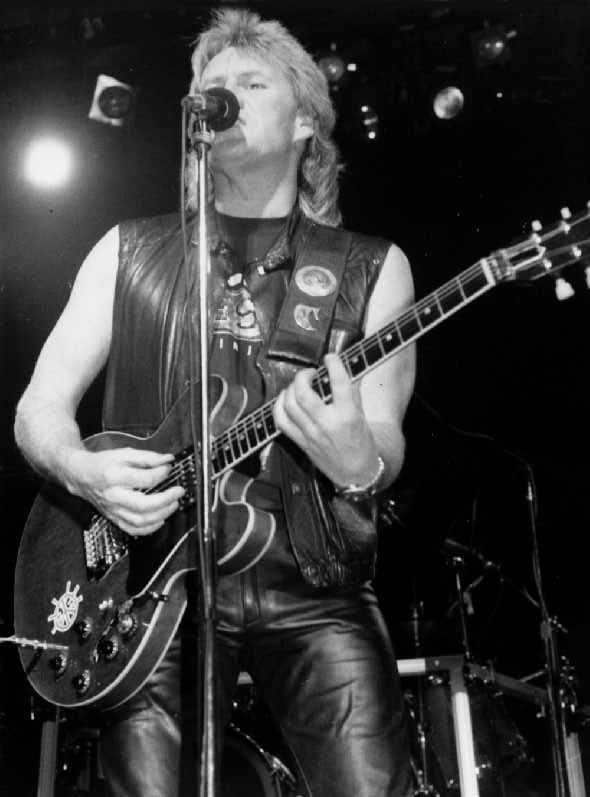
Photo by Lorry Doll |
Editor's
Note: Lorry
Doll met some pretty big stars not only through her work with NEON,
but throughout her music career. But the Alvin Lee meeting was the
only time I ever saw her get pre-interview jitters. In the days
before boy bands, a teen-aged Lorry had been a starry-eyed fan of
Ten Years After and in particular Lee. Not only did she have every
album he ever appeared on, but throughout the many years I knew her,
we never missed a single Ten Years After or Alvin Lee tour. So when
the time came to finally meet one of her biggest music heroes, she
was frantic with worry that he would turn out to be a jerk and
destroy her long-time image of him. But Alvin Lee's easy going
manner soon put an end to her fears. Ever the professional, Lorry
tried to keep her feelings to herself and conducted a very
informative interview until the session ended. Then when it
concluded, Lee got a real kick out of the numerous frayed, faded and
well-used albums that Lorry pulled from her bag for his autograph.
-
Jeff Rey |
This
communication grants agreement and authorization to publish the
text and photos of the copyrighted NEON Alvin Lee interview at
www.ten-years-after.com
We'd
like to thank Jeff Rey for his permission to post Lorry's
Interview on the TEN YEARS AFTER Fan Website
|
|